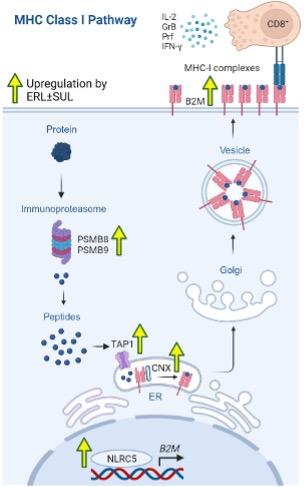The crux of our translational research is exploring the potential of natural compounds and innovative therapies to treat colorectal & intestinal cancer in its early stages. Our work focuses on:
🔬 Alternative Splicing (AS): Investigating how splicing alterations contribute to cancer development and identifying targeted interventions.
🧬 Immuno-Epigenetic Modulation: Exploring how immune regulation and epigenetic changes can be leveraged to halt tumor growth.
🛡️ MHC Upregulation: Investigating how therapies like Erlotinib and Sulindac enhance MHC-I/II antigen presentation pathways, potentially improving immune recognition of tumors (see adjacent figure).
🥦 Dietary Interventions: Studying bioactive compounds/metabolites in broccoli and spinach to modulate cancer-related pathways.
🧩 Chromatin Remodeling & HDAC Inhibition: Understanding how chromatin structure and histone modifications impact gene regulation in cancer.
⚙️ Protein Acylation: Uncovering novel post-translational mechanisms.
By integrating these approaches, we aim to develop innovative therapies that not only target the root causes of cancer but also improve prevention strategies — ultimately bridging the gap between lab discoveries and real-world impact.
The Antibody and Biopharmaceuticals Core (ABC) provides customized monoclonal antibody services using hybridoma technology to cater to the unique requirements of various research programs.

